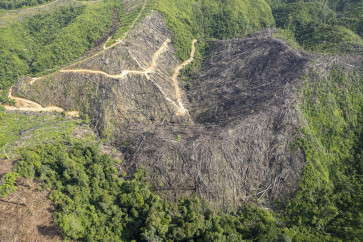Popular Reads
Top Results
Can't find what you're looking for?
View all search resultsPopular Reads
Top Results
Can't find what you're looking for?
View all search resultsRegional Autonomy: Mimika's rural areas rise after 20 years of neglect
During the Catholic missionary period, the village of Kokonao was a center of education, but when West Mimika's administration center moved to Timika city twenty years ago, it was gradually forgotten about
Change text size
Gift Premium Articles
to Anyone
During the Catholic missionary period, the village of Kokonao was a center of education, but when West Mimika's administration center moved to Timika city twenty years ago, it was gradually forgotten about.
Kokonao, the capital of West Mimika district, is situated in the mountainous region of Central Papua.
However, thanks to various development programs set up by the regency administration, the condition of the area has considerably improved. Fisheries, housing, clean water facilities and a number of other infrastructure projects have been established.
Thanks to this progressive infrastructure development, carried out in every village in West Mimika, residents of Kokonao now feel proud of their home.
A community figure in Kokonao, Yan Wakris, said residents no longer migrate to Timika city because the administration has paid attention to the area's development and infrastructure needs by implementing the Respek program, which is in line with people's wishes.
Respek, the Rural Development Strategic Program, was initiated by the Papuan provincial administration under the leadership of Governor Barnabas Suebu in 2007.
To further spur development in the region, the administration has involved residents in the more labor intensive projects, such as road, bridge and dock construction, so they may earn an income.
"Kokonao residents earn a living from marine resources, such as fish, crabs and squids, which offer the potential to improve their well being," Wakris said recently.
He added that people have benefited from an ice factory, jointly established by USAID and the Maria Bintang Laut cooperatives, under the patronage of the Timika diocese.
"Ice is very helpful to the fishermen in Kokonao. Now they can keep their catch fresh longer and sell them outside the area. Fish and crabs from Kokonao are much sought after by people in Timika city and outside the area," said Wakris.
Annually, Rp 100 million (US$10,500) for the Respek program in Mimika regency comes from the provincial budget. Additional funds for rural areas are disbursed by the Amungme and Kamoro Community Development Council.
The Respek program has focused development in rural areas in an effort to stem migration to Timika City, where new arrivals can seldom afford the cost of living or adapt to the pace of the city.
Some 100 people from Jila district recently converged on the Mimika Transportation and Tourism Office demanding it provide air transportation for them to return to their villages in Jila.
Jila tribal chief Petrus Ogomagai said residents wished to return and live in their villages because they cannot earn a living in Timika city.
"The only mode of transportation to Jila is by air. The runway of the airport in Jila has been paved and can serve small planes like the Pilatus Porter. Residents are tired of living in Timika," he said.










